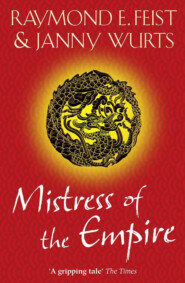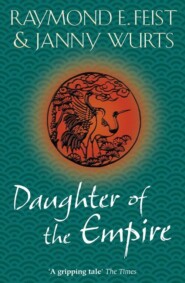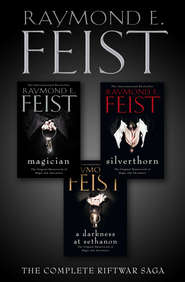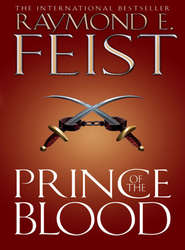По всем вопросам обращайтесь на: info@litportal.ru
(©) 2003-2024.
✖
The Complete Darkwar Trilogy: Flight of the Night Hawks, Into a Dark Realm, Wrath of a Mad God
Автор
Год написания книги
2018
Настройки чтения
Размер шрифта
Высота строк
Поля
The man paused at a door and knocked twice, paused again, and then repeated the knock. Then he opened the door.
They entered a small chamber with barely enough space to hold them. Within the room sat a single bed, a chair and a tiny table. Obviously this hide-out had been meant for one person. The man turned and said, ‘You’ll wait here until tomorrow night, then we shall move you.’
As he moved past the three boys, Zane and the others finally realised that a figure already lay on the bed, unconscious. At the door, the man turned and said, ‘We’ve done all we can. He had lost a lot of blood before he got here.’ He closed the door.
The boys looked down. ‘Caleb,’ Tad whispered, regarding the still form on the bed. His bandages were soaked in blood.
Zane slowly sat on the one chair, and Jommy and Tad settled on the floor to wait.
• CHAPTER FIFTEEN • (#ulink_7d464548-fe6f-5b93-b1a0-14a5f3adb5e9)
Deception (#ulink_7d464548-fe6f-5b93-b1a0-14a5f3adb5e9)
TAL CONSIDERED HIS CARDS.
He sat back slightly and glanced to his right, where Amafi stood motionless against the opposite wall. The former assassin-turned-servant had his right hand folded over his left. His eyes scanned the huge hall, which was unlike any gambling establishment in the north. Most gaming up in Roldem and the Kingdom of the Isles was done in well appointed salons or common taverns and inns. The Mistress of Luck was Kesh’s finest gambling establishment, without rival in any other nation.
Here, the normal venue appeared to be palaces, or as close to a palace as a commoner could find. This particular building had once belonged to a wealthy merchant, but in years past had become a haven for card players and gamblers of every stripe. It was located at the end of a long boulevard, on top of a hill, with a view straight up to the plateau and Imperial Citadel, and a rear vista of the lower city and the Overn Deep.
Tal sat in the middle of what must have been the grand hall where the merchant had entertained his guests, for instead of a wall, behind Tal stood columns of carved marble forming a colonnade that provided a panorama of the beautifully maintained gardens and the city below. The weather in Kesh was either hot or really hot, so the night air rarely invited a chill. Tal’s immediate concern however, was not for the décor, but for his safety, as his back was exposed to the garden, and lately people had been dying at inopportune times.
Tal had used his celebrity to gain admission to several galas, receptions and parties, as well as gambling establishments, and since arriving in Kesh he had wasted hours listening to idle gossip. But he had finally heard something that had led him to this place, and now he waited.
If what he had overheard two nights earlier was true, an imperial prince would be present in the hall tonight – incognito – ostensibly to relax and enjoy a night on the town. From what Chezarul’s agents had heard, there was a fair chance there would be an attempt on this Prince’s life soon. Tal was there to ensure that it did not happen tonight.
Earlier, Amafi had noticed that a pair of young nobles had been using a fairly obvious set of signals to communicate their respective hands, and that whoever was the weaker bid upped the pot and helped the other win more money.
It wasn’t a foolproof system, because the better hand still needed to beat everyone else at the table, but they won more often than not, and the pots here were much higher than average, so by the end of the evening, they usually found themselves ahead. Tal would have liked to teach them a lesson, but he had other concerns this night.
The son of a tribal leader, thrown into the intrigues of the Conclave of Shadows at a young age, one of the many useful things Tal had learned whilst growing up was how to cheat at cards. His skills had been both tested and sharpened playing four-handed poker with Nakor, Kaspar and Amafi – all skilled cheaters. One game had disintegrated into a cheating contest, with each hand becoming more outrageous than the last as large quantities of wine had been consumed, and ending only when three extra kings and two extra sevens appeared in the deck.
Tal played indifferently tonight, winning just enough to break even, but losing enough to keep attention away from himself. He excused himself from the table, saying, ‘I need a bit of air,’ and motioned for his servant to join him.
They went to the gardens, ostensibly to stretch their legs, but Tal wanted another quick inspection of their surroundings. When they were alone, Amafi said, ‘Something troubles you, Magnificence?’ He spoke Roldemish, to lessen the likelihood of being overheard.
‘Many things trouble me, Amafi.’
‘Not those two boys, certainly?’
‘No. Someone will teach them a lesson, but I’m afraid it won’t be me.’ Tal looked around the garden. ‘So far we’ve learned that our enemies are taking great care in deciding who they kill and where. But why are we now seeing them—’ he looked around the garden, and with a wave of his hand included the building behind them ‘—here, in this palace?’ He stared at the city below them, and said, ‘There must be twenty or more private rooms upstairs, so we don’t even know where the prince is going to be.’ He looked at Amafi. ‘This used to be your stock-in-trade. Would you attempt to kill a royal here?’
Amafi said, ‘No, but then I always preferred shadows to confusion.’
‘I’m not sure I follow,’ said Tal.
The former assassin took his master by the elbow and slowly turned him around to face the building. Tal saw a tableau that looked like a theatre stage, for from the garden, the ground floor of the house could be seen. Save for the entrances to kitchens and garderobes, it was simply one vast enclosure.
Amafi said, ‘Everyone is in plain sight, and that is good. Should someone wish to go upstairs, they must enter there.’ He pointed to the main entrance. ‘There is but one access to the upper rooms, that stairway against the right wall. I have not surveyed this monument to conspicuous greed completely, Magnificence, but I see no other exits. There may be a bolt hole to the street from a basement, but that’s immaterial, for anyone wishing to use it would first have to go through this room.’
‘So it is a good choice?’
Amafi shrugged. ‘When you kill, you must leave immediately. There can be no hesitation or you will stand a good chance of being caught. I prefer shadows. I prefer to be far from my victims before they are cold, let alone found. Others prefer chaos to cover their tracks.’ Amafi looked around the garden. ‘Were I forced to kill a man in there, I would be hiding somewhere … here, in the garden. In the confusion that followed upon the death of someone in there, I would be leaving from out here.’
Tal tried not to look obvious as he again turned to take in their surroundings. The garden was rectangular in shape, with a single rectangular pool at its centre. Low hedges lined the sides of the garden, and narrow paths took amblers to where they could look out over the city and down to the shores of the Overn Deep. A few benches and torch holders were also scattered around.
‘Crossbow?’
‘Too inaccurate,’ said Amafi. ‘But if no other alternative presented itself, perhaps. You, of course, could use a bow with great efficiency. I, on the other hand, would choose a dart.’
‘Dart?’
‘Tipped with poison.’ Caught up in the plan, Amafi glanced around. ‘I would conceal a blowpipe under my cloak. Or, if the night was warm, secrete it beneath my tunic, or up a sleeve. It needn’t be a long one, no more than thus,’ he held his hands about a foot apart – ‘and the dart would be hidden in a tiny pouch, strong enough to prevent me from being pricked and killed by my own weapon.
‘I would stalk my quarry until he made his intentions clear to me – he might sit at a gaming table here, go upstairs, or come into the garden. The skill lies in being ready in a moment; to have the blowpipe out and the dart inserted in seconds, then to strike the target and run before you see them fall to the floor.’
‘How can you be certain?’
‘There are several lethal venoms and plant extracts, Magnificence, that merely have to prick the skin to cause quick and certain death. They are very dangerous to handle, but if you are trained—’ He shrugged. ‘Not my first choice, but I know the art.
‘I would have already planned a way out of this garden,’ said Amafi, pointing to the rear wall, ‘I would have tied a rope to a statue hidden in a hedge, and I would climb down into the rear garden of the house below this one while the women up here began to scream and call for the guards, in short, I would be hidden by chaos.’
‘What would you use if not a blowpipe and poison?’
‘An expertly-thrown dagger could suffice, but that would increase the risk of being seen.’
‘I should think so.’
‘You would be amazed at what people do not see, Magnificence. They watch the body fall, they see the blood, they hear the women scream and the men curse, then they glance around to see if they are in danger, and they do not notice the unremarkable man in unremarkable garb no longer standing at the edge of the crowd. It is better if there’s a lot of running and screaming.
‘No, killing a man is fairly easy. It is killing him and not getting caught that makes it difficult.’
‘So, assuming the prince appears tonight, how would you kill him?’
‘Magnificence, I would never undertake such a contract. Killing rich merchants and even the minor nobility is one thing – there is a chance of retribution, but not a large one. Sooner or later the sons inherit their father’s estates and whatever is being paid to the local constabulary to hunt down the murderer is seen as an unnecessary expense; after all, it will not bring back their departed, no matter how beloved and missed.’
‘You are a cynical bastard, Amafi. Did anyone ever tell you that?’
‘More than once, Magnificence, but then, consider my trade.’ He smiled and shrugged. ‘No, to kill royals you’d have to employ fanatics. Those willing to give up their lives to see a son of the imperial house dead. A professional would never undertake such a contract.’
‘What about the Nighthawks?’
Amafi took Tal by the elbow and steered him to the farthest corner of the garden. ‘Among my calling, they are legendary. Being legends, there are equal measures of truth and myth to their story.’
‘Go on.’
‘It is believed that they were once a family, a large family of men and women who took the occupation of killing to a higher level, making it an art form. For generations they plied their trade quietly and without notice, save by those in need of such skills. Then, a hundred years ago something happened to them, they became a cult and their numbers multiplied. Then they were nearly obliterated by the soldiers of the Kingdom.
‘Since then, there have been rumours of their return.’











